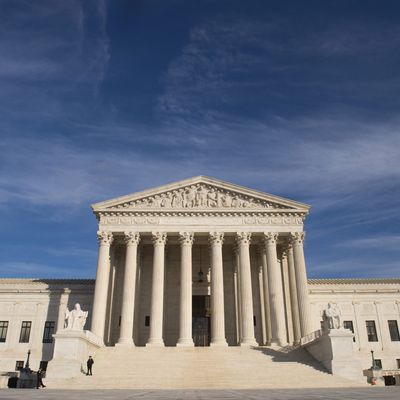
On Thursday, the Supreme Court denied an Alabama Muslim man’s request to have an imam present in the room for his execution, vacating the stay of a lower court’s order. Domineque Ray, who was convicted of killing a 15-year-old in 1995, was scheduled to be executed on Thursday evening at 7 p.m., before the U.S. Court of Appeals for the Eleventh Circuit granted an emergency stay. With that stay overturned in a 5-4 SCOTUS ruling, Ray, 42, was put to death by lethal injection on Thursday night, without his longtime imam, Yusef Maisonet, at his side.
On Wednesday, the U.S. Court of Appeals for the Eleventh Circuit wrote: “The central constitutional problem here is that the state has regularly placed a Christian cleric in the execution room to minister to the needs of Christian inmates, but has refused to provide the same benefit to a devout Muslim and all other non-Christians.” “The Claim presented by Domineque Ray touches at the heart of the Establishment Clause,” a panel of three judges determined, referring to the section of the First Amendment that prohibits the state from establishing preference toward a certain religion. “That, it appears to us, is what the Alabama Department of Corrections has done here,” wrote the judges.
The Supreme Court disagreed, considering the lower court’s stay “an abuse of discretion.” Because Ray had waited until January 28, the week before his execution, to file an appeal, the Supreme Court ruled in Alabama’s favor, upholding the state’s claim that Ray was denied his request to maintain the prison’s safety. But, Ray — a devout Muslim since 2006 — was only informed that an imam would not be allowed in the room on January 23, meaning he had just two full business days to confer with his lawyers and file the appeal.
Justice Kagan provided the dissenting opinion, claiming that Rae’s “treatment goes against the Establishment Clause’s core principle of denominational neutrality.” Kagan, who was joined in the dissent by the Court’s liberal judges, asked, “Why wouldn’t it be sufficient for the imam to pledge, under the penalty of contempt, that he will not interfere with the State’s ability to perform the execution? The State doesn’t say.” Though Imam Maisonet was not in the room, the prison did agree to Ray’s request that a Christian chaplain was not present for his injection, and that Maisonet was with Ray up until he passed into the execution chamber.
Ray has been incarcerated at the Holman Correctional Facility in Atmore, Alabama, for nearly 20 years, following his conviction in 1999 for raping and killing a 15-year-old girl — just five and a half months after the then-22-year-old was found guilty in the murders of two teenage boys two hours north in Selma. But, according to a report from ProPublica, Ray’s lawyers have claimed that the attorney representing their client did not adequately defend him, that prosecutors withheld evidence of other suspects, and that the state withheld evidence casting doubt on the testimony of a critical witness, who was suffering from schizophrenia when he testified.
Shortly after the SCOTUS ruling came in around 9 p.m., Ray was executed. He was the 64th inmate executed in Alabama since the death penalty was reinstated in 1976.






























